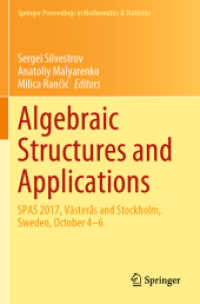- ホーム
- > 洋書
- > 英文書
- > Philosophy
Full Description
This book defines a logical system called the Protocol-theoretic Logic of Epistemic Norms (PLEN), it develops PLEN into a formal framework for representing and reasoning about epistemic norms, and it shows that PLEN is theoretically interesting and useful with regard to the aims of such a framework.





